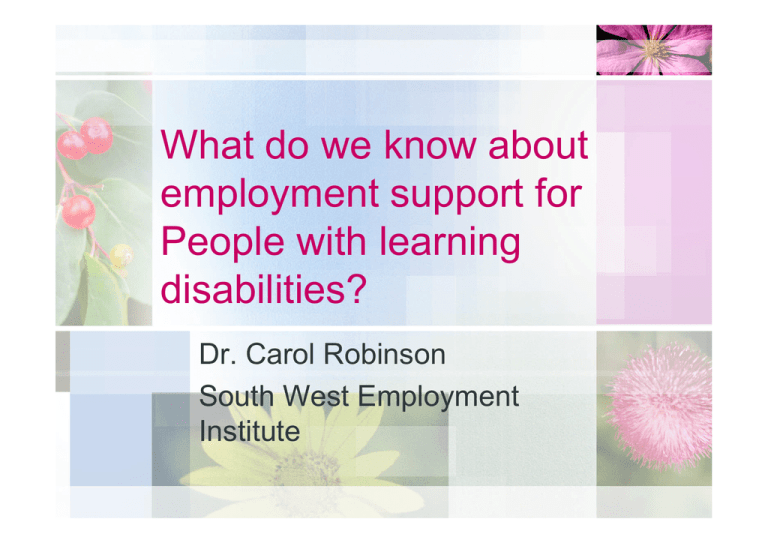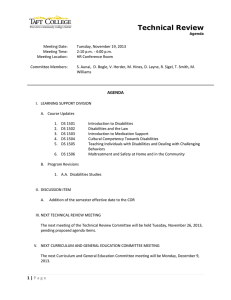What do we know about employment support for People with learning disabilities?
advertisement

What do we know about employment support for People with learning disabilities? Dr. Carol Robinson South West Employment Institute Overview of the afternoon • A quick quiz • Policy messages and messages from research. • What stops people with learning disabilities getting paid jobs and careers? • A Customised Approach to Supported Employment • Group work: case studies- what might you do? • New areas of work in the South West Government Thinking ‘Welfare dependency is a significant problem in the UK today . Around 1.4 million people have been out of work benefit ..., at least 12million working age households receive financial support from the Government each week . This costs around £85 billion per annum Welfare dependency creates a number of costs for individual and for society. For individuals it can set people apart from the rest of society, with evidence to suggest that the source of income may be more important then the level of income in determining levels of social exclusion ‘Disengagement from the labour market ...can have wider effects the longer people remain out of work , ... the more likely it is that their health will deteriorate and more obstacles to work will develop’ Government Thinking ‘There is also clear evidence that worklessness contributes to ill health , unhappiness and depression , with people who move into work tending to report substantial improvement in Mental Health. ...’ ‘Less than half of all disabled people are employed with some groups such as people with learning disabilities having a significantly lower employment rate , and a further 10% are unemployed’ ‘Employment offers the best and most sustainable route out of poverty...,’ Quotations taken from Iain Duncan-Smith Secretary of State for Work and Pensions- State of the nation report: poverty, worklessness and welfare dependency in the UK Recent Government Initiatives • Get Britain Working • Work Programme designed to streamline previous work initiatives • Workstep replaced by Work Choice • Work Capability Assessment 2011. 1.5m reassessed - either get Employment and Support Allowance or JSA (Harrington review) • Work Clubs • Sayce Report- recommended portable personalised support & doubling of Access to Work What does the research say? • People with moderate and severe learning disabilities can learn and gain paid work • Supported Employment provides better outcomes than Sheltered employment • Gender differences • Job losses tend to be for social reasons not inability to do the job • Few hours in work and low wages mean incomes not much improved but over 16hrs, people are better off Supported Employment Research findings • Self esteem higher and engagement in meaningful activity tend to be greater than if people are in day services • Inconclusive results relating to Quality of Life measures but people with mild learning disabilities tend to benefit most. • Volunteering appears to be useful if used for improving prospects of work, not otherwise. • However, case for work experience in school is strong if well organised. What works for people with a learning disability learning jobs? Severe • • • • • Moderate Training on the jobSystematic Instruction Job coach support on-site Breaking tasks into steps “Chaining” tasks together Hierarchy of cues – Physical guidance – Gestures – Verbal prompts • • • • Job adaptation if needed Managing praise and reinforcement more closely Specific social training strategies Work-based accreditation of skills demonstrated Mild • • • • • Pre-employment training is possible Verbal instruction & demonstration Simple language Greater time to learn Use of naturally occurring praise and re-inforcement through: – Supervisors, work-mates – Ordinary pay incentives • • • Managing work pressure/ productivity demands Shaping social contact through co-workers Qualifications for job and career development Stephen Beyer, Cardiff University 2011 What works in finding jobs? Severe Moderate Greater use of support to find & plan Families Job coaches Extended Vocational Profiling/ Discovery 20+ hours in various environs? Interests and what good at Relevant experiences Work types and environments Days and schedules Welfare benefit planning Use of practical job tryouts to aid decision-making Aided CV and support planning Proactive and specific job finding and matching jobs to people Employer presentation and negotiation Adaptation of interview and induction Mild Greater independent action More use of generic help to identifying strengths, interests and experience Use of more generic sources for vacancies Greater use of courses, “job clubs” CV development Job search Writing applications More use of mainstream job application & interviewing and induction processes Stephen Beyer, Cardiff University 2011 Why isn’t it happening? • Little investment in Supported Employment since the 80’s • Much more investment in sheltered work than in community jobs • Belief that people with severe learning disabilities could not work • Too much emphasis on preparation for work rather than work itself • A workforce that is not well trained and lacks confidence Occupational standards Supported Employment: Invitation to comment on the new Occupational Standards The Learning and Skills Improvement Service (LSIS) is developing new National Occupational Standards (NOS) which describe what a person needs to do, know and understand in their job to carry out their role in a consistent and competent way. Deadline for comments is 2 March 2012. All the information and downloads you need to comment on the draft standards is available on the Excellence Gateway: http://www.excellencegateway.org.uk/page.aspx?o=320143



